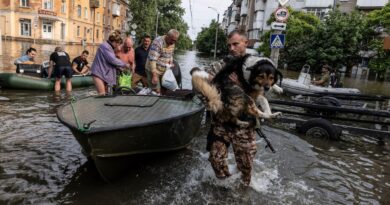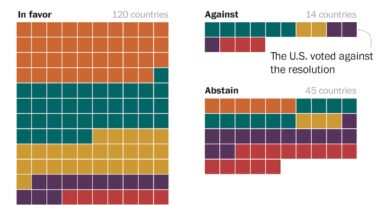Ukraine denies Russian claim Kyiv sent drones to hit Kremlin
There was no independent verification of the purported attack, which Russia authorities said occurred overnight but presented no evidence to support it. Questions also arose as to why it took the Kremlin hours to report the incident and why videos of it also surfaced later in the day.
A video posted overnight on a local Moscow news Telegram channel, shot from across the river from the Kremlin, appeared to show smoke rising over the buildings. It wasn’t possible to ascertain its veracity. According to text accompanying the footage, residents of a nearby apartment building reported hearing bangs and seeing smoke around 2:30 a.m.
Another video on social media, which looks to be taken from across Red Square, appears to show the moment a drone explodes in a flash of fire above the roof of the Senate Palace in the Kremlin, near a flagpole flying the Russian tricolor, with debris falling on the roof. It also was not possible to independently verify this footage.
The Kremlin said Russian military and security forces had stopped the drones before they could strike. Nobody was hurt, it added. Its official website said debris from the drones fell on the Kremlin grounds without damage.
President Volodymyr Zelenskyy, on an unannounced visit to Helsinki for talks with the leaders of five Nordic countries, denied any role.
“We don’t attack Putin or Moscow. We fight on our territory. We’re defending our villages and cities,” he said at a news conference.
Ukraine presidential adviser Mykhailo Podolyak said the claims could provide a pretext for Russia “to justify massive strikes on Ukrainian cities, on the civilian population, on infrastructure facilities.”
White House press secretary Karine Jean-Pierre said the U.S. was “unable to confirm the authenticity” of Russia’s claim.
Asked whether the U.S. believed Putin was a lawful target of any potential Ukrainian strike, Jean-Pierre said that since the start of the conflict, the U.S. was “not encouraging or enabling Ukraine to strike beyond its border.”
U.N. deputy spokesman Farhan Haq said that the United Nations “is not in a position to confirm these reports. We strongly reiterate our call on all concerned to refrain from any rhetoric or action that could further escalate the conflict,” Haq said.
The purported drone attack would be a significant escalation in the 14-month conflict, with Ukraine taking the war to the heart of Russian power.
Phillips O’Brien, professor of strategic studies at the University of St. Andrews, said, “It certainly wasn’t an attempt to assassinate Putin, because he doesn’t sleep in the roof and he probably never sleeps in the Kremlin.”
He added it was too soon to prove or disprove whether it was a Russian attempt “either to make Ukraine look reckless or to buck up Russian public opinion” or if it was a Ukrainian operation to embarrass Russia.
James Nixey, director of the, Russia and Eurasia program at the Chatham House think-tank, said “the two most likely possibilities are a ‘warning shot across the bows’ by Kyiv or a false flag operation by Moscow designed to justify more intense attacks in Ukraine or more conscription.”
If it was a warning shot by Kyiv, then it was “yet another shocking security lapse by the Russian state,” he said.
“If it’s a false flag operation by Moscow, then it reeks of desperation,” Nixey added. “And it’s a high-risk strategy likely to be exposed, considering how poor their tradecraft seems to be.”
The alleged attack prompted calls in Russia from pro-Kremlin figures for assassinations of senior leaders in Ukraine.
The Kremlin claimed the attack was planned to disrupt Victory Day, which Russia celebrates in Red Square on May 9 to commemorate the defeat of Nazi Germany in World War II. Peskov said the parade would go on as scheduled.
Before the news about the alleged attack broke, Moscow Mayor Sergei Sobyanin issued a ban on using drones in the Russian capital, with an exception for those launched by authorities. He gave no reason for the ban, saying only it would prevent the “illegal use of drones that can hinder the work of law enforcement.”
Zelenskyy was in Finland seeking greater firepower for his armed forces as they figure out how to dislodge Russian troops from occupied areas of Ukraine.
Both Ukraine and Russia reportedly have experienced ammunition shortages after a winter of long-range shelling and missile strikes. Kyiv has been pressing its allies for more as officials consider when to start driving Russian forces out of Ukrainian territory they occupy.
Zelenskyy said Ukraine’s counteroffensive is coming “very soon.”
This year “will be decisive … for victory,” he said.
The Nordic countries — Finland, Sweden, Norway, Denmark and Iceland — have been among Kyiv’s strongest backers since Russia invaded Ukraine in February 2022. Before meeting Zelenskyy, Nordic officials appeared ready to provide more aid.
“Here in the north, we have a more unpredictable and aggressive Russian neighbor, and it is important that we discuss together how to face this new situation,” Norwegian Prime Minister Jonas Gahr Støre said.
In fighting Wednesday, 16 civilians were killed in a “massive attack” by Russian forces on southern Kherson province, the Prosecutor General’s Office said.
Russian fire hit the train station and the only open supermarket in the regional capital, also called Kherson, killing 12 people and wounding 22, officials said. Three energy workers died when they came under fire while making repairs north of the city.
The talks came a day after U.S. officials said Washington plans to send Ukraine about $300 million in additional military aid, including an enormous number of artillery rounds, howitzers, air-to-ground rockets and ammunition.
The weapons will all be pulled from Pentagon stocks, so they can go quickly to the front, according to the officials who spoke on condition of anonymity because the aid has not yet been formally announced.
Elsewhere, Russia used Iranian-made drones during its third attack on Kyiv in six days. Explosions were heard in the capital and elsewhere during the night as Ukrainian air defenses shot down 21 of the drones, Ukraine’s air force said. No damage or casualties were reported
Meanwhile, a massive blaze broke out at an Russian oil depot in Russia’s southern Krasnodar region, east of the Russian-held Crimean Peninsula, according to Krasnodar Gov. Veniamin Kondratyev.
He didn’t say what caused it, but some Russian media outlets said it was likely from a Ukrainian drone attack. There was no official comment on that possibility.
Residents heard an explosion shortly before the fire erupted, Russian news site Baza said.
Military analysts think Ukraine is targeting Russian supply lines while gearing up for a possible counteroffensive amid improving weather and as it receives more weapons and ammunition from the West.
Yevgeny Prigozhin, head of the Wagner mercenary group whose fighters are a key force in the grinding months-long battle for the eastern town of Bakhmut, was quoted by Russian media as saying Wednesday that he believes the counteroffensive is underway.
“I believe that the offensive of the Ukrainian army has, in fact, already begun. We see the highest activity of enemy aviation, we see the highest activity along the perimeter and inside our front,” he said, according to the reports.
Explosions also derailed a Russian freight train and hit a Russian airfield in recent days. Last weekend, a massive fire erupted at an oil depot in Crimea after it was hit by two Ukrainian drones, a Russia-appointed official said.
In anticipation of a Ukrainian counteroffensive, Russian forces are focused on destroying logistical routes and centers of Ukraine’s armed forces with long-range strikes, Kyiv military officials say.
At the same time, Russia plans to continue talks with the U.N. and other parties to an wartime agreement on facilitating Black Sea agricultural shipments, Kremlin press secretary Dmitry Peskov said ahead of talks on Friday.
Earlier Wednesday, Russian Foreign Ministry spokeswoman Maria Zakharova confirmed new consultations between Russia and the U.N. on access of Russian agricultural products and fertilizers to the world market would be held in Moscow.
Signed in July and renewed twice, the deal freed Ukrainian grain shipments that were held up in the country’s blockaded ports last year. The deal expires May 18 unless Russia agrees to its renewal.
Jari Tanner in Helsinki, and Jan M. Olsen in Copenhagen, Denmark, contributed.
___ Follow AP’s coverage of the war in Ukraine at https://apnews.com/hub/russia-ukraine




